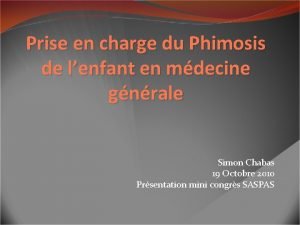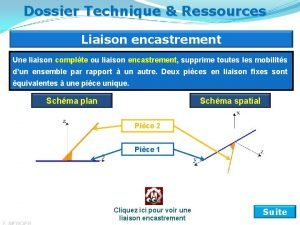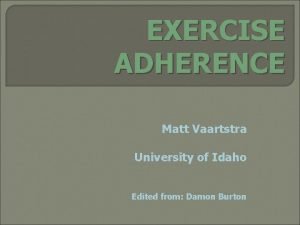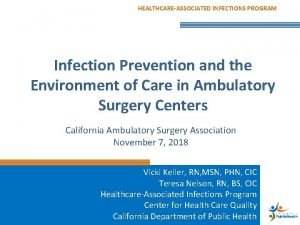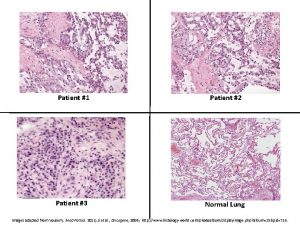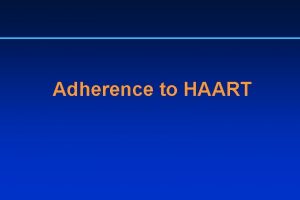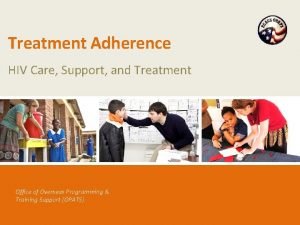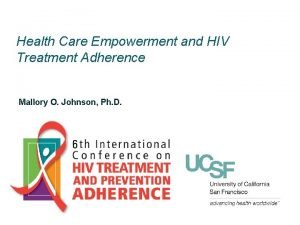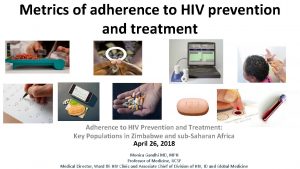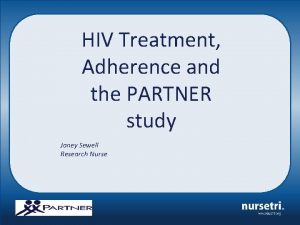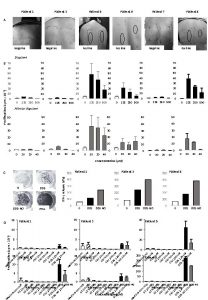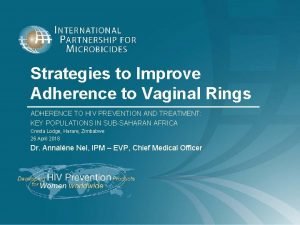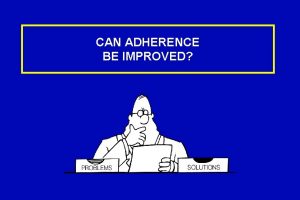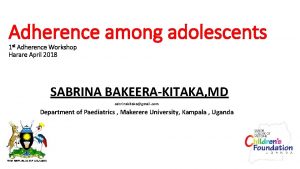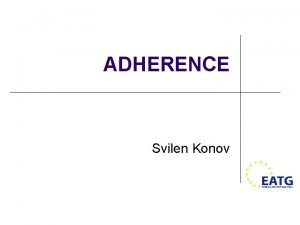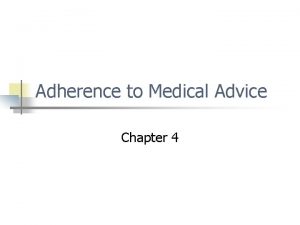HIV Treatment Adherence Levels Patient Literacy and Health
















- Slides: 16

HIV Treatment Adherence Levels, Patient Literacy, and Health Care Provider-Patient Communication: A Global Survey of 2, 035 Patients Jean B. Nachega, MD, Ph. D; Chelsea Morroni, MD, Ph. D; Renslow Sherer, MD; Mauro Schechter, MD, Ph. D; Jurgen Rockstroh, MD; Suniti Solomon, MD; Jose Zuniga, MD Johns Hopkins University, Baltimore, MD, USA; University of Chicago, IL, USA; Federal Univ. of Rio de Janeiro, Brazil; Univ. of Bonn, Germany; Center for AIDS Research & Education; Chennai, India International Association of Physicians in AIDS Care, Chicago, Illinois, and Washington, DC, USA 6 th IAPAC-NIMH Adherence Conf. Miami, FL; May 22 -24, 2011; Abstract#70488

ATLIS 2010 • Multi-country, comparative, treatment awareness survey of 2, 035 people living with HIV/AIDS (PLWHA) o Examines global attitudes and perceptions of HIV • Main survey objectives: o Explore different treatment practices and awareness levels to reveal different ways in which people live with HIV/AIDS across the world o Explore how different social and cultural factors affect and impact the lives of HIV-positive patients o Investigate how patients interact with their primary healthcare provider (HCP), and understand the dialogue that takes place between HCPs and patients

Countries Surveyed

Lead Authors GLOBAL José M. Zuniga, Ph. D AFRICA Jean B. Nachega, MD, Ph. D President/CEO, IAPAC, Chicago, Illinois, and Washington, DC, United States Professor of Medicine, Stellenbosch University, Cape Town, South Africa EUROPE Jürgen Rockstroh, MD, Ph. D ASIA-PACIFIC Suniti Solomon, MD Professor of Medicine, University of Bonn, Germany Director, Y. R. Gaitonde Center for AIDS Research and Education (YRG CARE), Chennai, India LATIN AMERICA Mauro Schechter, MD, Ph. D NORTH AMERICA Renslow Sherer, MD Professor of Infectious Diseases, Federal University of Rio de Janeiro, Brazil Professor of Medicine, University of Chicago, Illinois, United States

Methodology • • • Fieldwork conducted January – March 2010 o Survey vendor: Kantar Health Twenty-minute interviews to include 30 -day self report of missing ART doses and issue related ART adherence, resistance, HCP-patient communication o Internet o Phone o Face-to-face Incentives offered where customary Respondent qualification: o Informed consent to participate in survey o Age 18+ o Diagnosed with HIV/AIDS by a primary HCP o On antiretroviral therapy Institutional Review Board (IRB) approval Task Force review of data

Survey Methodology & Sample Geographic Markets Global Total Sample Size n= Methodology Geographic Spread 2, 035 North America 201 U. S. 201 Internet National Europe 1, 133 France 200 Internet National Germany 200 Internet National, spread across five regions Italy 224 Face-to-Face National spread of physician offices Russia 102 Face-to-Face Major Cities: Moscow, St. Petersburg, Nizhny Novgorod, Krasnoyarsk, Omsk, Voronezh and Kaliningrad Spain 207 Telephone National U. K. 200 Telephone National, spread across 10 health authority regions Asia/Pacific 200 Australia 100 Internet South Korea 100 Face-to-Face Seoul and surrounding vicinity Latin America 201 Brazil 201 Face-to-Face Major Regions: Sao Paulo, Rio de Janeiro, Salvador, Belo Horizonte, Curitiba Africa 300 Côte d'Ivoire 100 Face-to-Face Major Cities: Abidjan, Bouake, Yamoussoukro and Dalia South Africa 200 Face-to-Face Major Cities: Johannesburg, Tshwane, Durban, Cape Town, East London and Port Elizabeth National

ATLIS 2010 ART Adherence Survey • Properly adhering to HIV medications as prescribed is crucial for effectively managing the disease and avoiding the emergence of drug-resistant virus and disease progression • The AIDS Treatment for Life International Survey (ATLIS 2010), a cross-sectional study from January 2010 to March 2010 in 12 countries in North America, Latin America, Europe, Africa and Asia/Pacific (n=2035) • Goal: to investigate patients' health-literacy with respect to HIV treatment adherence and drug resistance, and to assess patientprovider communication about these topics.

Survey Results ATLIS 2010 Health Literacy & ART Adherence • Overall, 57% of participants reported no missed dose of their HIV treatment over the past month; highest levels of adherence were in Latin America (89%) and Africa (73%) and lowest in North America (45%) (p<0. 01). • Forgetfulness was the most common reason cited for sub-optimal adherence (74%). Running out of medication was most common in Ivory Coast (25%) and significantly higher there than in all other countries studied: France (16%), United States (13%), Germany (7%), Italy (10%) or Korea (1%) (p<0. 01)

Improved communication between patients and their HCPs is critical for optimal ART adherence Respondent Knowledge of Adherence and HIV/AIDS Treatment Adherence Global Total North America Europe Asia-Pacific Latin America Africa 57% 45% 50% 47% 89% 73% 78% 82% 81% 90% 74% 62% 18% 35% 14% 16% 24% % of Respondents Who Identified HIV Resistance as a “Bad Thing” 82% 65% 87% 84% 76% % of Respondents who correctly identified the proper meaning of HIV resistance when presented with several options 57% 72% 63% 62% 44% 28% Key Finding % of Respondents Who Never Missed a Dose of Their HIV/AIDS treatment in the Past Month % of Respondents Who Expressed They Knew What Resistance Is % of Respondents Who Identified HIV Resistance as a “Good Thing”

Overall, most participants (87%) agreed their healthcare providers (HCPs) stress the importance of ART adherence, but only 71% cited practical recommendations from their HCPs to maintain optimal adherence; citation rates were lowest in the U. S. (62%) and highest in Latin America and Africa (both 80%)

ATLIS 2010 Health Literacy & ART Adherence • ART adherence levels were inversely related to duration of HIV infection: 49% of participants living with HIV for more than 15 years missing no doses in the past month compared with 73%, 61%, and 57% of those who had been living with HIV for <1 year , 1 -5 years and 6 -10 years, respectively (p<0. 05, for all comparisons) • Individuals who reported discussing adherence with their HCP were more likely to understand the meaning of HIV resistance and its health implications (83% vs. 72%, p<0. 05).

• Reported excellent ART adherence was better for participants who reported having had good discussion with their HCPs about adherence issues versus those who had not (57% vs. 50%, p=0. 05). • Independent predictors of 30 -day self-report missing more than one dose in MLR model were: side effects (OR: 1. 23, 95%CI: 1. 07 -1. 42); living in North America (0 R: 1. 68; 95%CI: 1. 28 -2. 22), Europe (OR: 1. 65; 95%CI: 1. 40 -1. 95) or Asia Pacific (OR: 2. 20; 95%CI: 1. 68 -2. 89) and not belonging to a support group (OR: 1. 24; 95%CI: 1. 12 -1. 37)

Conclusions • Global heterogeneity in ART adherence levels and barriers • Best practices ART adherence guidelines, practical tools, and promotion of HCPpatient communication on these issues are badly needed

ATLIS 2010 was funded by Merck & Co. , Inc. , Whitehouse Station, NJ USA, which operates in many countries as Merck Sharp & Dohme

Thank You South Africa • Beatit • Moretele Sunrise Hospice • Bophelong MES Impilo Hospice • Sicelinceba Health Organisation • Tswaragang • Hermanus Rainbow Trust • SAMAREC Australia • NAPWA - National Association of People Living with HIV/AIDS • PLWHA (Vic) Inc- People Living With HIV/AIDS - (In Victoria) • Queensland Positive People • Western Australian AIDS Council • PLWHA (SA) - People Living With HIV/AIDS - (In South Australia) • Positive Life (NSW) Inc • Positive Women's Network Korea • KANOS - Korea HIV / AIDS Network of Solidarity • Love 4 one Russia • Human Action ('Gumanitarnoye Deystviye') • Regional Center for Prophylaxis and Treatment of AIDS and Infectious Diseases • Social and Psychological Center "Doveriye“ • Center for Prophylaxis and Treatment of HIV of Sverdlovsk Region • Jasen U. K. • • • Positively Women (local branches) Positive Action local branches) Terence Higgins Trust (local branches) AB Plus (local Branches) Body Positive (local branches) Côte d'Ivoire • Lumiere Action • Club Des Amis (Association Des Personnes Vivant Avec Le Vıh) • Aıbef (Association Pour Le Bien Etre Familial) • Le Mıssı • Cip Cames • Fsu Com • Chu De Yopougon • Hôpital General Yopougon Attie (Port Bouet) • Fsu Com Abobo Avocatier • Hôpital Fsu Abobo Baoule • General D'Anyama • Centre plus de yopougon

Q&A Session
 Exercise behavior and adherence
Exercise behavior and adherence Adhérence préputiale traitement
Adhérence préputiale traitement Liaison par adhérence
Liaison par adhérence Soudure serp
Soudure serp Declakon
Declakon Negative pressure room
Negative pressure room Comparison of media literacy and information literacy
Comparison of media literacy and information literacy Medium in mil
Medium in mil Multimedia diagram mil
Multimedia diagram mil Cyber literacy and digital literacy
Cyber literacy and digital literacy Language and literacy levels
Language and literacy levels Patient 2 patient
Patient 2 patient Treatment levels statistics
Treatment levels statistics J harvey rodgers school
J harvey rodgers school Patient acuity levels
Patient acuity levels Clairvia thr
Clairvia thr Level 3 question examples
Level 3 question examples

